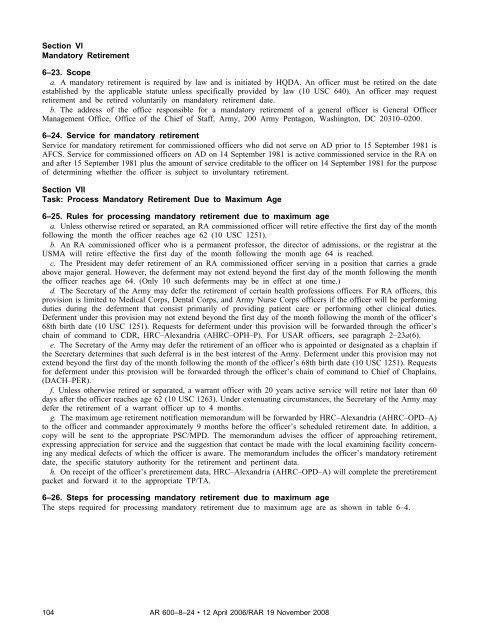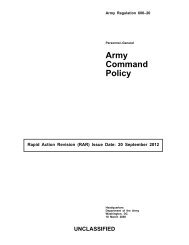Officer Transfers and Discharges - Army Publishing Directorate ...
Officer Transfers and Discharges - Army Publishing Directorate ...
Officer Transfers and Discharges - Army Publishing Directorate ...
Create successful ePaper yourself
Turn your PDF publications into a flip-book with our unique Google optimized e-Paper software.
Section VI<br />
M<strong>and</strong>atory Retirement<br />
6–23. Scope<br />
a. A m<strong>and</strong>atory retirement is required by law <strong>and</strong> is initiated by HQDA. An officer must be retired on the date<br />
established by the applicable statute unless specifically provided by law (10 USC 640). An officer may request<br />
retirement <strong>and</strong> be retired voluntarily on m<strong>and</strong>atory retirement date.<br />
b. The address of the office responsible for a m<strong>and</strong>atory retirement of a general officer is General <strong>Officer</strong><br />
Management Office, Office of the Chief of Staff, <strong>Army</strong>, 200 <strong>Army</strong> Pentagon, Washington, DC 20310–0200.<br />
6–24. Service for m<strong>and</strong>atory retirement<br />
Service for m<strong>and</strong>atory retirement for commissioned officers who did not serve on AD prior to 15 September 1981 is<br />
AFCS. Service for commissioned officers on AD on 14 September 1981 is active commissioned service in the RA on<br />
<strong>and</strong> after 15 September 1981 plus the amount of service creditable to the officer on 14 September 1981 for the purpose<br />
of determining whether the officer is subject to involuntary retirement.<br />
Section VII<br />
Task: Process M<strong>and</strong>atory Retirement Due to Maximum Age<br />
6–25. Rules for processing m<strong>and</strong>atory retirement due to maximum age<br />
a. Unless otherwise retired or separated, an RA commissioned officer will retire effective the first day of the month<br />
following the month the officer reaches age 62 (10 USC 1251).<br />
b. An RA commissioned officer who is a permanent professor, the director of admissions, or the registrar at the<br />
USMA will retire effective the first day of the month following the month age 64 is reached.<br />
c. The President may defer retirement of an RA commissioned officer serving in a position that carries a grade<br />
above major general. However, the deferment may not extend beyond the first day of the month following the month<br />
the officer reaches age 64. (Only 10 such deferments may be in effect at one time.)<br />
d. The Secretary of the <strong>Army</strong> may defer the retirement of certain health professions officers. For RA officers, this<br />
provision is limited to Medical Corps, Dental Corps, <strong>and</strong> <strong>Army</strong> Nurse Corps officers if the officer will be performing<br />
duties during the deferment that consist primarily of providing patient care or performing other clinical duties.<br />
Deferment under this provision may not extend beyond the first day of the month following the month of the officer’s<br />
68th birth date (10 USC 1251). Requests for deferment under this provision will be forwarded through the officer’s<br />
chain of comm<strong>and</strong> to CDR, HRC–Alex<strong>and</strong>ria (AHRC–OPH–P). For USAR officers, see paragraph 2–23a(6).<br />
e. The Secretary of the <strong>Army</strong> may defer the retirement of an officer who is appointed or designated as a chaplain if<br />
the Secretary determines that such deferral is in the best interest of the <strong>Army</strong>. Deferment under this provision may not<br />
extend beyond the first day of the month following the month of the officer’s 68th birth date (10 USC 1251). Requests<br />
for deferment under this provision will be forwarded through the officer’s chain of comm<strong>and</strong> to Chief of Chaplains,<br />
(DACH–PER).<br />
f. Unless otherwise retired or separated, a warrant officer with 20 years active service will retire not later than 60<br />
days after the officer reaches age 62 (10 USC 1263). Under extenuating circumstances, the Secretary of the <strong>Army</strong> may<br />
defer the retirement of a warrant officer up to 4 months.<br />
g. The maximum age retirement notification memor<strong>and</strong>um will be forwarded by HRC–Alex<strong>and</strong>ria (AHRC–OPD–A)<br />
to the officer <strong>and</strong> comm<strong>and</strong>er approximately 9 months before the officer’s scheduled retirement date. In addition, a<br />
copy will be sent to the appropriate PSC/MPD. The memor<strong>and</strong>um advises the officer of approaching retirement,<br />
expressing appreciation for service <strong>and</strong> the suggestion that contact be made with the local examining facility concerning<br />
any medical defects of which the officer is aware. The memor<strong>and</strong>um includes the officer’s m<strong>and</strong>atory retirement<br />
date, the specific statutory authority for the retirement <strong>and</strong> pertinent data.<br />
h. On receipt of the officer’s preretirement data, HRC–Alex<strong>and</strong>ria (AHRC–OPD–A) will complete the preretirement<br />
packet <strong>and</strong> forward it to the appropriate TP/TA.<br />
6–26. Steps for processing m<strong>and</strong>atory retirement due to maximum age<br />
The steps required for processing m<strong>and</strong>atory retirement due to maximum age are as shown in table 6–4.<br />
104 AR 600–8–24 12 April 2006/RAR 19 November 2008
















